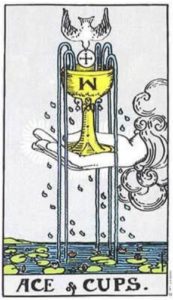
Ace of Cups
I often talk about how important it is to use your own interpretations and intuition when reading the Tarot. Looking to outside resources such as books and websites thwarts the growth of your intuition and your ability to trust yourself.
There are two sides to this idea, especially when beginning with the Tarot. On one hand, outside info is extremely useful! On the on the other hand, you are far less likely to trust your own intuition if you keep looking to those outside resources, and you can develop a dependency on other people’s interpretations.
The Tarot is a system of archetypes and symbols open for interpretation, and was in use before written language was mainstream. People were accustomed to looking at pictures for meaning. With the Tarot, we have the collective idea about a symbol or an archetype within a card, and we have our own meaning layered on top of that. We usually feel good when we draw “The World,” and we can feel equally bad when we draw “The Tower.” (As we learn, we move to a more objective viewing about both of them!)
In class last Tuesday, we talked about the experience of writing down our own thoughts and perceptions about a card, and then looking up the card. I find a good adjunct to that is to look up three different sources: the book that came with your deck, another book that was written about the Tarot, and then look online. When you look at various sources, you’re looking at other people’s perceptions mixed with their research which is mixed in with the global concept of a card.
This is where your interpretation becomes so very real. Yes, you will find illumination when looking up a card, and more times than not you will find your interpretation in your findings in some fashion.
Here are three different interpretations of the Ace of Cups:
- Wiki says that it, “signifies beginnings in the area of the social and emotional in life.”
- The book that came withe the “Cosmic Tarot” deck only gives a list of words: “abundance, satisfaction, joy,” and a few more.
- “The Ultimate Guide to the Rider Waite Tarot” (mini review: a great idea for a Tarot book written in an okay-ish way with what I regard as Tarot misinformation) provides this with the Ace of Cups as a card of the day: “Cleanse away what is muddying your feelings. Clarify your emotions.”
Can you feel into the fullness that is beyond these words? You will find more depth ideas in books and other reference materials, but when you’re looking for more insight about your personal life, and you pull his lovely Ace of Cups, what do you feel? What does your intuition tell you?
I believe that those who write about the Tarot are writing from their study and their own inner landscape, and it is rich material, and the material is right, excellent and good information – for them. Your inner landscape is much richer coming from your own experience and your life in this moment.
One last note, have you ever asked someone for advice, and you realize their advice is about their interpretation of their life laid on top of yours? They respond with their experience – which is different from yours, and the advice doesn’t feel like it fits – even though we might take it into consideration? That’s the way it is with getting information about a card from another resource.
So! Look at your cards, see what you come up with just by feeling and looking deeply. Let me know what you find!
What do I see in the Ace of Cups? That it is time to listen to our inner voice, our intuition, and move forward!
Brightest blessings,
Sally

Beautiful article, Sally! While I do use traditional interpretations as touchpoints, I long ago began to trust my instinct as opposed to what the card is “officially” supposed to mean. Before I took your course, I still only “leaned toward” trusting my intuition over the traditional meanings. Even though I had read for many years, I still deferred to the traditional meanings when my intuition was uncertain, or not speaking confidently. After I took your course, I began to trust my intuition more, even when that voice is not bold. Thank you so much for offering the resources you provide!